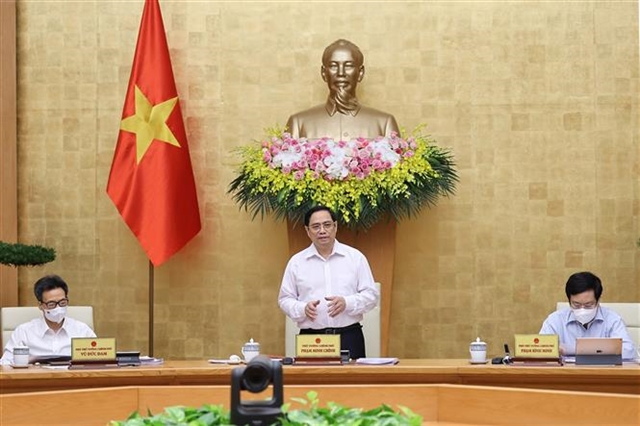 Politics & Law
Politics & Law


|
| Prime Minister Phạm Minh Chính (centre) chairs the Government’s regular meeting for June. — VNA/VNS Photo Dương Giang |
HÀ NỘI — Participants discussed the country's socio-economic situation in the first six months of the year, as well as directions and tasks for the last six months of 2021 during the Government’s monthly meeting on Thursday.
Chairing the meeting, Prime Minister Phạm Minh Chính emphasised that the country must be proactive, flexible, creative, and harmonise COVID-19 pandemic prevention and socio-economic development.
Accordingly, in some places, priority must be given to pandemic prevention and control, while in some others, priority must be given to socio-economic development, and elsewhere, it is necessary to balance both goals.
For example, Bắc Ninh and Bắc Giang have given priority to preventing the pandemic recently, and are now giving priority to promote production and business. Some localities like Hà Nội need a harmonious, reasonable and effective combination of the two tasks. HCM City and southeast provinces are having to focus on pandemic prevention. Moreover, even in a locality like HCM City, some districts should focus on pandemic prevention, but in other districts, the pandemic situation is not a priority, thus they must focus on economic development.
Speaking at the meeting, Minister of Planning and Investment Nguyễn Chí Dũng stated that in the first six months of the year, the global economy witnessed an uneven recovery. Developed countries recovered quite strongly while developing countries recovered slowly. New strains of COVID-19 such as the Delta and Delta plus are spreading like wildfire in many countries, so some countries have to re-establish disease prevention measures. The effects of limited supply and difficulties in trade have increased commodity prices and inflation, so countries must balance controlling inflation, public debt and maintaining a loose fiscal and monetary policy for economic recovery.
Domestically, the economy faces many difficulties and challenges, mainly from the outbreaks with new strains of COVID-19, increasing prices of real estate, goods, raw materials and transportation.
But, thanks to efforts of the whole political system, drastic and timely direction of the Government and the PM, the joint work of the business community and the people, the socio-economic situation continued to develop positively, both to prevent the COVID-19 pandemic and to maintain and promote production and business.
Việt Nam successfully organised major political events in the country such as the 13th Party Congress, the election of the 15th National Assembly and People's Councils at all levels for the 2021-26 term.
A report by the Ministry of Planning and Investment clearly showed the main results of the socio-economic situation in the first six months of the year with macroeconomic stability and positive economic growth despite the pandemic’s impact.
The gross domestic product (GDP) growth rate reached 5.64 per cent, much higher than the same period last year.
Economic balances are guaranteed, while the progress of budget revenue is positive, accumulatively in six months reaching 57.7 per cent of the estimate, up 15.3 per cent over the same period last year.
Food security is ensured although some countries are facing food shortages. The country maintained energy security and operated the electricity market in a stable manner.
The initial results in implementing dual goals, ensuring security and defence and promoting foreign relations have helped strengthen and consolidate the trust of the people, businesses and the community with the leadership of the Party, State, Government and the Prime Minister, said Dũng.
Also at the meeting, Minister of Health Nguyễn Thanh Long said that it was expected that from the third quarter of this year, a large number of COVID-19 vaccines will arrive in Việt Nam – about 30 million doses.
Ministries and agencies are continuing to promote research, technology transfer and domestic vaccine production.
The Government and the PM have directed the implementation of a vaccination campaign on a national scale, striving for 70-75 per cent of the population to be vaccinated by the end of this year and the beginning of next year. — VNS




